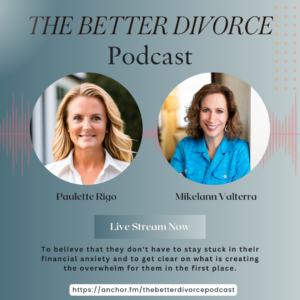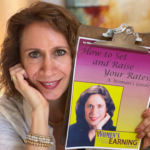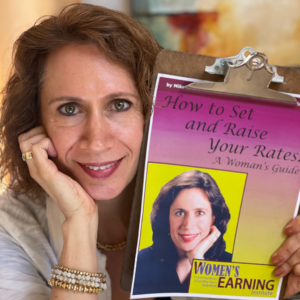 By Mikelann Valterra, MA. AFC®
By Mikelann Valterra, MA. AFC®
One of the best questions to ask yourself when you debate spending a larger sum of money is “what does my future self think of this?” Asking this question lifts and expands your vision and thinking. It takes you from living solely in the moment, week or month, to thinking about who you are becoming. Wow. In fact, considering the “future you” has one of the biggest impacts on our relationship to money.
The problem is that we often think of our future self as a different person whom we don’t feel very connected to. This is known as “temporal discounting,” meaning we discount the future. Our future self simply doesn’t seem like us. So, it feels as if we are sacrificing for a 3rd person we don’t identify with. (“I guess I shouldn’t buy that thing I want. I should ‘go without’ today, to save money for this future self tomorrow. What a drag.”)
Our future self is so disconnected from us that we prioritize the present at the expense of hurting this future self. But the problem is that it is up to us to take care of who we will be in the future—to ensure this future version of us has what she needs to be happy– money, good health, time to enjoy life. Who else will take care of her, if we don’t?
The good news is that our future self holds great financial wisdom, and life wisdom.
So, the real question is, “HOW to connect to the future you?
Often, I find just stopping and remembering to think about my future self, and what her advice would be for me, is a powerful move. However, the more we engage with her, the better our decisions. It’s about developing a relationship with our future self, so we are more connected to our future. She becomes a trusted partner.
Remember, this is not about living only for the future. You simply want to include the future you in your discernment and decision making process.
So, how do we get to know our future self better? Do this:
Stop for a moment. Close your eyes. Take a few deep breaths. Now envision yourself in ten years. What does your environment look like? What are you wearing? What is your home like? If you have kids, how old are they? Where are they? Who are you spending time with? How do you feel physically? What are you doing with your time? Journal on this. Think about this. Envision this. Share this.
Then, when a large purchase decision arises, ask her—“Do you think I should spend this money? Are you happy for me or worried for me?” Ask for guidance and insight.
When I debated investing a lot of money into branding and upgrading my website in my business, I consulted the future Mikelann by doing some journaling. (see below.) She had a lot of interesting thoughts, including asking me where I saw my business in ten years! She was cautious about simply throwing money at current problems.
When I wanted to buy a $4,000 couch, I asked her opinion. (She likes home design too.) She countered that it seemed amazing, but could I then maybe wait on the new dishwasher?
When I wanted to extend a potential international trip for an extra week, I checked with my future self by taking a long walk and thinking about what she would advise me, and then came home and did some journalling. She was nervous. Why was she nervous? She was worried about my energy and brought up how stressed I would be on my return with a backed-up client schedule. She also felt the extra money wasn’t worth it and it would make it difficult to keep my investing on track for the year. And this investing is ultimately for her, so she has more time in the future than I have right now in the present.
Sometimes she is excited and knows the purchase is for our mutual self-care. She liked the personal trainer, for example, even though it was rather expensive.
Do you want to access the wisdom of your future self? If so, here are 8 ways to access the future you for making money decisions:
- Get out your journal or a legal pad and answer this question—“ What does my future self think about spending this money? Is she happy for me or worried for me?” Try to write a short paragraph. What do you notice?
- Go a step further and write your future self a letter, asking for her advice. Then pretend you are her and write yourself back a letter.
- Advanced writer idea: Create a dialogue– imagine you are writing a two person scene, and go back and forth—creating a conversation between you and your future self about your potential spending.
- Take a walk with your future self and imagine her advice to you as you walk with her. Is she happy or worried about this spending?
- Use your active imagination. Do a relaxation and then spend time really visualizing her in your mind. Then ask her for advice and imagine her response.
- Look for synchronicities. The universe speaks to us. Let your future self speak through the world we move in. Pose the question you have about if you should spend this money, and then look for signs around you as you move throughout your day. One time I asked the question, “should I spend the money and attend this dance festival”? I looked out for signs all day. On the way to the gym, I passed a bus that said, “Don’t buy it now. Wait for the upgrade offer”. Wow. That was a pretty clear message. Sure enough, I waited, and a better deal came when I talked to a friend the following week about a similar festival.
- In your prayer time, invite her to pray with you. She is a prayer partner you may not have considered before.
- For the verbal processers, use your wonderful friends. Tell them, “I’m trying to figure out what my future self thinks of buying this, and if she is happy or worried about me…” Good friends will let you talk it out.
Connecting with your future you is a unique combination of accessing your intuition, stepping away from instant gratification, and being thoughtful about the future. Few things are more important.
So, ask yourself, what does the future me think of this? Is she excited? Happy? Nervous? She will tell you if you listen.


 Financial therapy in action
Financial therapy in action
 From money fog to tango, this is a fun podcast episode. I guested on Bernie Borges Midlife Fulfilled Podcast, that is for those over 40 who are ready to thrive. We talked about the connection between money and happiness, how to simplify your finances, and yes, tango. Part of working with money is getting clear on what is important to you and protecting it.
From money fog to tango, this is a fun podcast episode. I guested on Bernie Borges Midlife Fulfilled Podcast, that is for those over 40 who are ready to thrive. We talked about the connection between money and happiness, how to simplify your finances, and yes, tango. Part of working with money is getting clear on what is important to you and protecting it. In this conversation, Paulette Rigo of the Better Divorce Podcast, and I delve into the intricate relationship between divorce and finances. Does financial anxiety disproportionately affect women? Yes! We talk about the emotional aspects of money management, and the importance of understanding one’s money story. I also talk about the differences in how men and women approach financial anxiety and the significance of addressing these feelings to regain control over one’s financial future. AND we explore the historical shifts in women’s financial empowerment, with stories from our own families. From me, to mom, to my grandmother. Whew! Intense! So, listen in for a fascinating discussion of women, divorce and our relationship to money. You really can have a “better divorce”.
In this conversation, Paulette Rigo of the Better Divorce Podcast, and I delve into the intricate relationship between divorce and finances. Does financial anxiety disproportionately affect women? Yes! We talk about the emotional aspects of money management, and the importance of understanding one’s money story. I also talk about the differences in how men and women approach financial anxiety and the significance of addressing these feelings to regain control over one’s financial future. AND we explore the historical shifts in women’s financial empowerment, with stories from our own families. From me, to mom, to my grandmother. Whew! Intense! So, listen in for a fascinating discussion of women, divorce and our relationship to money. You really can have a “better divorce”.


 Listen in on a great conversation I had with Susie Pettit from the
Listen in on a great conversation I had with Susie Pettit from the 
 By Mikelann Valterra, MA, AFC
By Mikelann Valterra, MA, AFC


 By Mikelann Valterra
By Mikelann Valterra
 Note- I originally published this article years ago when my son was ten years old, and have updated it because my new book, How to Set and Raise Your Fees—a heart-centered guide for coaches, counselors, and consultants, comes out in September 2024. See end to be notified of book release and classes.(This is a picture of me holding the original cover of the book from 2006. That was me 18 years ago!)
Note- I originally published this article years ago when my son was ten years old, and have updated it because my new book, How to Set and Raise Your Fees—a heart-centered guide for coaches, counselors, and consultants, comes out in September 2024. See end to be notified of book release and classes.(This is a picture of me holding the original cover of the book from 2006. That was me 18 years ago!)